Discover how Samson's hair held the secret to his biblical strength and led to a tale of love, betrayal, and redemption.
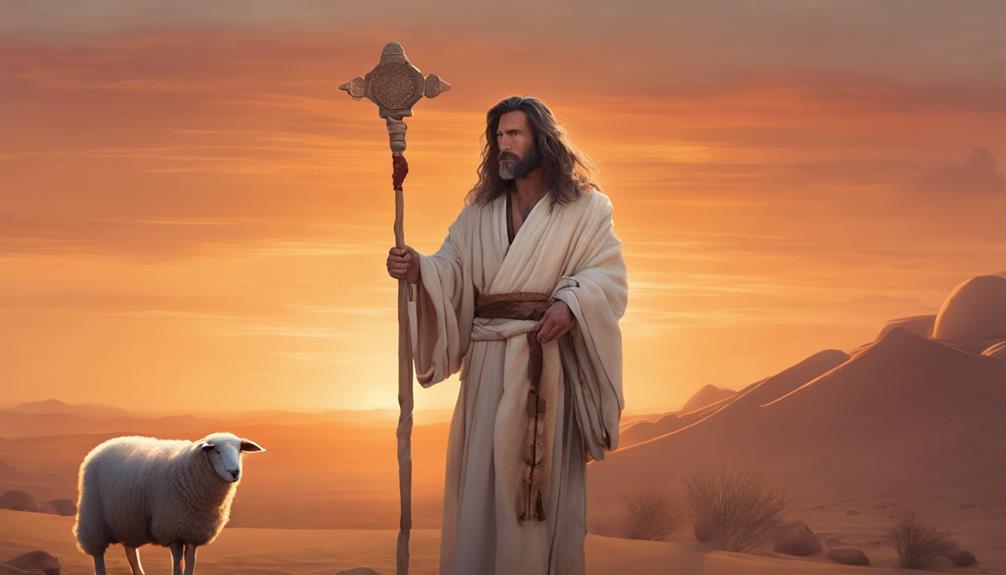
Man in the Bible With Long Hair
In the tapestry of biblical narratives, the story of Samson is a vivid thread, marked by his extraordinary strength and the long hair that symbolized his Nazirite vow to God. You've probably heard snippets of his feats and his downfall, but there's much more depth to his story than the Sunday school version.
His life was a complex blend of divine destiny and human frailty, with lessons that resonate far beyond his time. If you're curious about the real source of his strength, and how a woman named Delilah fits into the picture, you're on the brink of uncovering a tale that intertwines faith, power, and betrayal.
Key Takeaways
- Samson's uncut hair symbolized his Nazirite vow and spiritual commitment to God.
- His hair was a divine source of strength, representing the intertwining of faith and destiny.
- Violating his Nazirite vows, including cutting his hair, led to Samson's downfall and loss of strength.
- Samson's story highlights the complex relationship between spiritual dedication, personal weaknesses, and divine intervention.
The Nazirite Vow
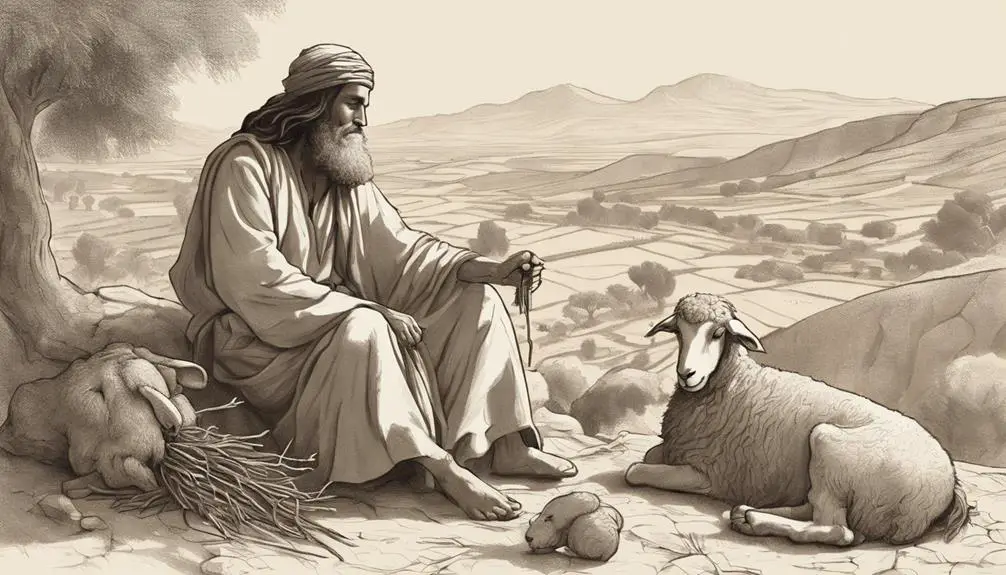
In analyzing the Nazirite vow, it's crucial to understand that this unique commitment involved abstaining from wine, avoiding contact with corpses, and notably, not cutting one's hair, symbolizing a special consecration to God. This set of practices defined the Nazirite rules, each element deeply rooted in the idea of spiritual dedication and purity.
You'll find that the abstention from wine wasn't just about avoiding alcohol; it represented a broader renunciation of worldly pleasures, emphasizing a life focused on spiritual pursuits rather than physical indulgence. Similarly, steering clear of corpses wasn't merely about physical cleanliness but underscored a separation from the cycle of life and death, aligning oneself more closely with the divine, eternal nature of God.
The uncut hair, perhaps the most visible sign of the Nazirite vow, served as a constant, public declaration of one's commitment to God. It wasn't just a matter of personal piety but a statement to the community about the individual's spiritual dedication. Through these practices, the Nazirite vow delineated a path of holiness, setting apart individuals for a special relationship with the divine.
Samson's Birth and Destiny

One of the most compelling narratives in the Bible is the story of Samson's birth and predetermined destiny, deeply intertwined with the Nazirite vow from before his conception. This tale commences with an angelic announcement, a celestial messenger appearing to Manoah and his barren wife, foretelling the birth of a son who'd begin to deliver Israel from the Philistines.
This divine intervention, laden with the weight of a nation's hope, underscores the miraculous nature of his conception and the sacred duties expected of him.
However, this revelation was met with parental disbelief, a common biblical motif that highlights human skepticism in the face of divine promises. Manoah's request for the angel to return and reiterate the instructions underscores the struggle to grasp the enormity of their roles as the parents of a chosen deliverer. The angel's compliance and the subsequent fulfillment of the prophecy through Samson's birth encapsulate a pivotal moment where faith and destiny converge.
This narrative segment, rich in theological and cultural implications, sets the stage for Samson's life, marked by divine purpose yet entangled with human frailty and divine tests.
The Secret of His Strength
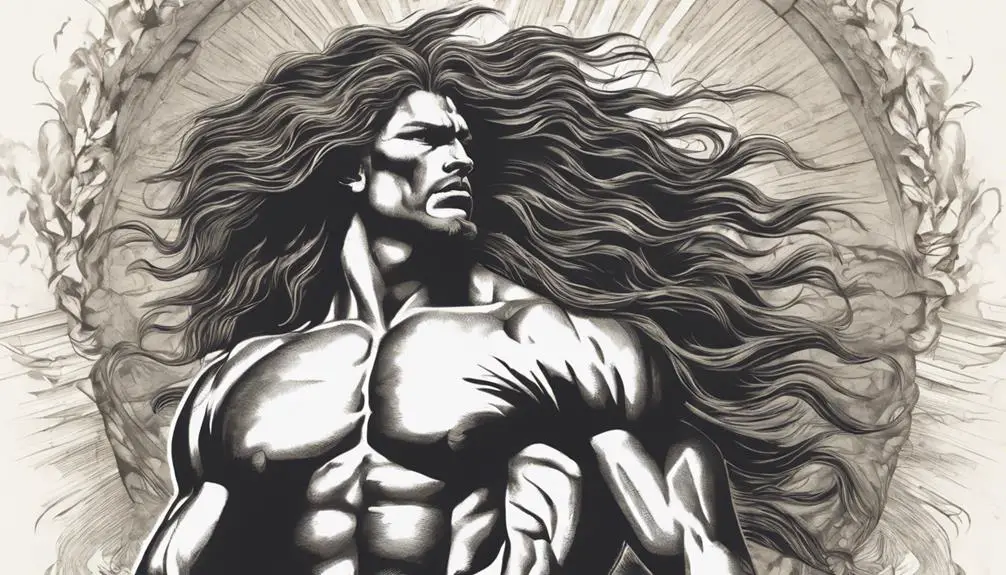
Having explored the miraculous circumstances of Samson's birth and his divine appointment, we now turn our attention to the source of his unparalleled strength, which lies in his adherence to the Nazirite vow, particularly the stipulation against cutting his hair. This vow not only sets Samson apart as dedicated to God but also imbues his hair with profound symbolism and power.
- Hair Symbolism: In many cultures, hair symbolizes strength, virility, and spiritual power. Samson's long hair isn't merely a personal choice but a divine mandate that symbolizes his consecration to God. It's a tangible manifestation of his unique relationship with the divine, acting as the locus of his supernatural strength.
- Cultural Perceptions: The cultural context of Samson's era viewed hair not just as a part of one's appearance but as an integral element of identity and religious fidelity. By maintaining long hair, Samson aligns himself with a tradition that sees hair as a vessel of sacred power.
- Divine Prohibition: The prohibition against cutting his hair isn't merely a test of obedience but a continuous affirmation of Samson's devotion and submission to God's will. This obedience is the true source of his strength, underscoring that his physical prowess is as much a spiritual endowment as it's a physical one.
Samson's Triumphs and Downfalls
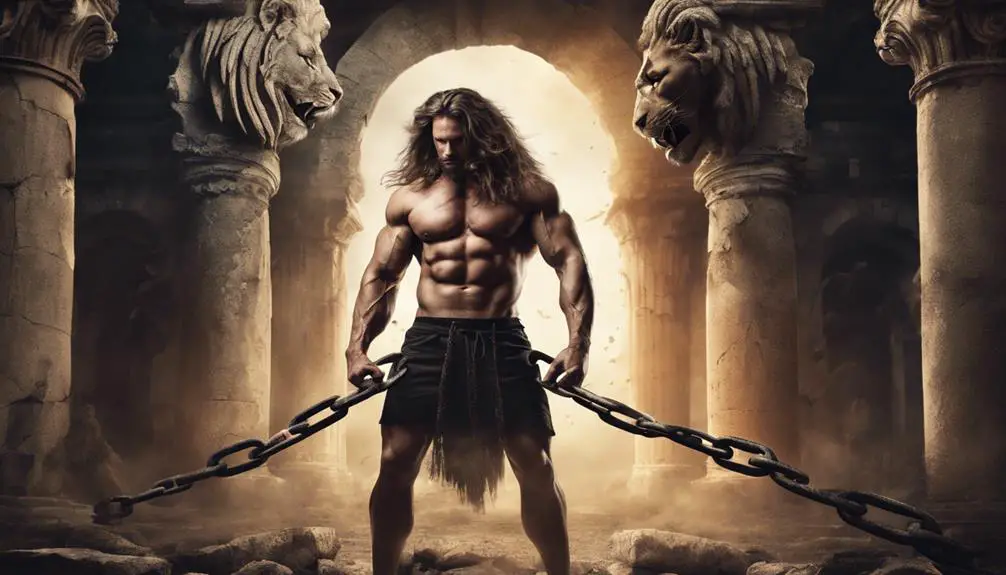
Samson's narrative arc, marked by both monumental victories and profound failures, serves as a testament to the complex interplay between divine favor and human frailty. You witness his Herculean feats against the Philistines, where his strength, granted by God, enables him to defeat vast armies single-handedly. These Philistine battles underscore his role as a judge and deliverer of Israel, showcasing his triumphs as divinely ordained.
Yet, Samson's story isn't devoid of moral ambiguity. His actions, often driven by personal vendettas and impulsive desires, blur the lines between righteous indignation and personal revenge.
His downfall is as dramatic as his victories. His failings, particularly his susceptibility to temptation and disregard for Nazarite vows, illustrate a man wrestling with his human imperfections. Despite his divine calling, Samson's choices frequently lead him away from his spiritual obligations, culminating in scenarios that weaken his position against his enemies.
It's this oscillation between divinely inspired victories and self-inflicted failures that encapsulates the essence of Samson's story. It's a vivid portrayal of how strength and weakness can coexist, offering profound insights into the nature of faith, power, and human vulnerability.
The Betrayal by Delilah
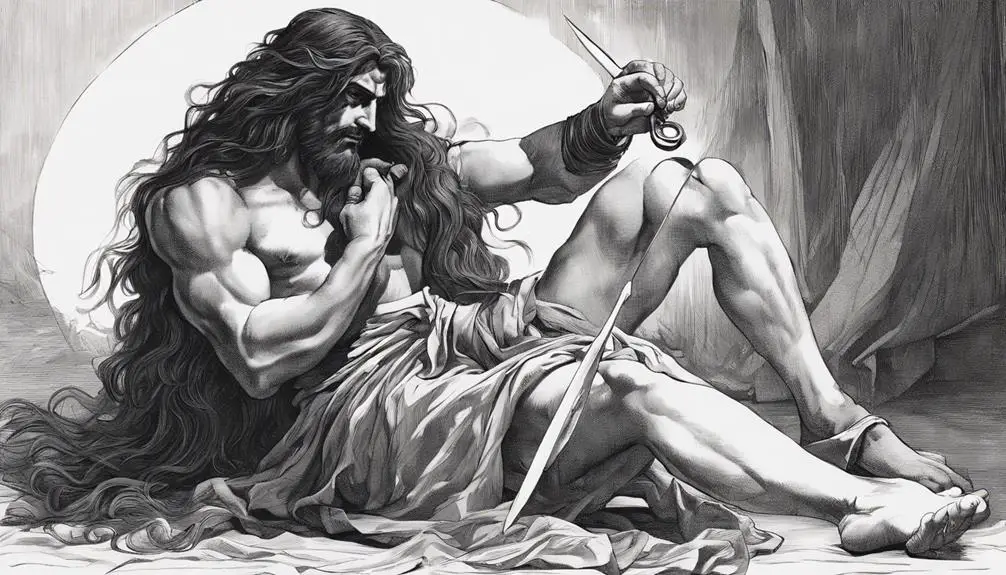
The pivotal moment in Samson's narrative arrives with Delilah's betrayal, an act that not only reveals the fragility of trust but also underscores the tragic consequences of personal weaknesses exploited by others. This betrayal, deeply woven into the fabric of religious and historical texts, stands as a stark reminder of the complexities of human relationships and the devastating impact of deceit.
- Delilah's Motives: Delilah's reasons for betraying Samson have been a subject of much debate. Was it purely monetary gain, as suggested by the Philistine rulers' offer of silver, or were there deeper, more personal reasons? The text invites readers to ponder the multifaceted nature of her betrayal, suggesting that her motives mightn't be as straightforward as they appear.
- Historical Accuracy: The account of Samson and Delilah challenges scholars and theologians to consider the blend of myth and history. While the narrative fits the archetype of a hero's downfall, it also prompts inquiries into its historical veracity. How much of this story is rooted in actual events, and how much is a moral lesson wrapped in historical garb?
- Personal Weaknesses: Delilah's exploitation of Samson's vulnerability—his secret strength derived from his uncut hair—highlights the danger of personal weaknesses being manipulated. This aspect of the narrative serves as a cautionary tale about the risks of exposing one's Achilles' heel to those who might exploit it for their own ends.
Legacy and Lessons Learned

One must consider the enduring influence of Samson's saga, particularly how it teaches us the importance of understanding our vulnerabilities and the consequences of our choices. Samson's long hair wasn't merely a physical trait but symbolized his Nazirite vow to God, encapsulating the profound interconnection between faith, strength, and identity. This narrative invites you to delve into the rich tapestry of hair symbolism and its cultural interpretations across ages.
Aspect |
Impact |
|---|---|
Hair Symbolism |
Represents strength, identity, and divine covenant. |
Vulnerability |
Teaches the importance of recognizing personal weaknesses. |
Choice & Consequence |
Highlights the ramifications of decisions on destiny. |
Cultural Interpretations |
Offers varied meanings in different societies. |
Samson's story is a scholarly treasure trove, offering lessons on the complexities of human nature, the potency of faith, and the intricate dance between divine gifts and personal responsibility. It serves as a mirror reflecting the consequences of our actions, urging you to ponder the balance between physical strength and moral fortitude. Moreover, it enriches our understanding of cultural interpretations of hair symbolism, showcasing how physical attributes can embody spiritual and moral qualities across diverse contexts.
Frequently Asked Questions
How Did the Cultural and Societal Views on Long Hair for Men Differ Across Various Ancient Civilizations, and How Did That Impact the Israelites' Perception of Long Hair?
In ancient times, societal views on men's long hair varied widely. The Greek influence often celebrated long hair as a symbol of strength and nobility, shaping perceptions across civilizations.
This clashed with other cultures that saw it as impractical for a warrior identity. You'd find that the Israelites' views were influenced by surrounding cultures, including the Greeks, leading to a nuanced perception of long hair that balanced traditional beliefs with external influences.
Are There Other Significant Biblical Figures Besides Those Taking the Nazirite Vow or Samson Who Were Noted for Having Long Hair, and What Was Their Significance?
You're diving into a topic where hair symbolism plays a crucial role, particularly in Absalom's rebellion. Absalom, unlike most, was known for his remarkably long hair, which became symbolic of his pride and eventual downfall.
This unique trait sets him apart from other biblical figures, highlighting how personal attributes can intertwine with one's fate. Analyzing Absalom's story offers deep insights into the complex interplay between appearance, identity, and destiny in biblical narratives.
How Has the Interpretation and Significance of Long Hair for Men, Particularly in the Context of Religious Devotion, Evolved in Judeo-Christian Traditions Through the Centuries?
You're exploring how the view of men's long hair, especially in religious devotion, has shifted over centuries in Judeo-Christian traditions.
Initially, hair symbolism was closely tied to religious mandates, with figures like monks adopting tonsure to signify humility. Yet, over time, societal norms evolved, challenging and reshaping these ancient views.
Today, the significance of long hair in religious contexts varies widely, reflecting broader cultural changes and a move away from rigid interpretations.
In What Ways Have Modern Archaeological Findings or Historical Research Shed Light on the Practical Aspects of Wearing Long Hair in Ancient Times, Such as Grooming Practices or Social Status Indicators?
Recent studies have illuminated the practicalities of sporting long hair in ancient societies.
You'd discover hair hygiene wasn't just about cleanliness but also reflected one's social standing.
Accessory trends, from simple bone combs to intricate gold hairpins, indicate a rich culture of personal grooming and status display.
Researchers digging into ancient texts and artifacts have pieced together how these practices varied across regions, offering a detailed glimpse into past lifestyles.
Can the Symbolism and Reverence of Long Hair in Biblical Times Be Connected to Any Specific Theological Themes or Moral Lessons That Transcend the Specific Stories of the Nazirite Vow or Samson?
Absolutely, the symbolism of long hair in biblical narratives isn't just a tale as old as time; it's a universe of meaning, bursting at the seams. Hair symbolism weaves through the texts, acting not only as moral metaphors but also as threads connecting divine wisdom with earthly existence.
This imagery isn't merely about aesthetics; it's a profound exploration of commitment, strength, and the sacred, offering insights that transcend the literal stories to impart timeless theological themes.
Conclusion
Intriguingly, Samson's tale, as detailed above, coincidentally mirrors the human condition: profound strength intertwined with vulnerability. Analyzing his journey, you find that his hair wasn't just a source of physical prowess but symbolized a deeper, spiritual covenant with God.
His downfall, precipitated by betrayal, underscores the perennial struggle between personal integrity and temptation. Samson's legacy, thus, serves as a poignant reminder of the dual nature of human capabilities and frailties, urging you to reflect on the inherent lessons within your own life's narrative.



Sign up